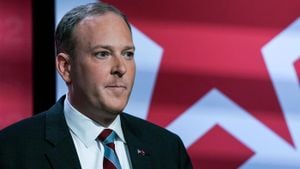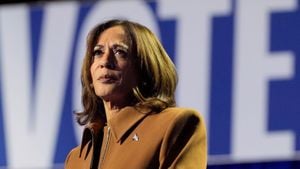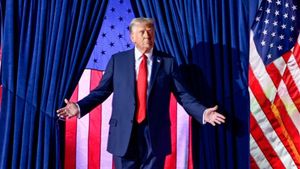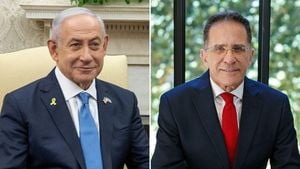Washington, D.C. – President-elect Donald Trump made headlines this week as he returned to the capital, marking his first visit since the contentious end to his presidency nearly three years ago. His arrival was met with fanfare as he was greeted by House Republicans with standing ovations and cheers, emphasizing the party’s resurgence following last week's elections.
After securing control of the House, Trump joined his fellow Republicans at the Hyatt Regency where he declared, "Isn’t it nice to win? It’s always nice to win!" His spirits were high, clearly reveling in the energy of his party, which regained its strength under his leadership. House Speaker Mike Johnson praised Trump, referring to him as the "comeback king" and asserting, "We owe him great gratitude." Trump later gave his blessing for Johnson to remain as Speaker, indicating solidified backing within party leadership.
Following his Republican celebration, Trump made his way to the White House for what was described as a cordial meeting with President Joe Biden, during which both leaders emphasized the importance of ensuring a smooth transition of power – something Trump uniquely disrupted when he lost to Biden four years prior. Snapping photo opportunities and holding what appeared to be amiable discussions, the two leaders shook hands and exchanged pleasantries. Biden welcomed Trump with, "Congratulations, Donald! I look forward to having, like they said, a smooth transition. Welcome back." Trump reciprocated with gratitude, stating, "Politics is tough, and it’s, in many cases, not very nice. But it is nice today, and I appreciate it very much."
The juxtaposition of Trump’s triumphant return and the years of tumult following Biden's election was stark. Four years ago, Trump incited chaos, refusing to recognize the results, challenging the validity of the election, and supporting actions leading to the insurrection at the Capitol. This time around, he seemed more collected, perhaps committed to proving he could handle the nuances of political leadership with grace.
During the Oval Office meeting, Biden and Trump reportedly discussed pressing national issues such as the war in Ukraine and tensions with Hamas. Trump expressed his desire to understand Biden’s perspective on these matters, showing what could be perceived as newfound willingness to collaborate with his predecessor’s team. According to Trump, "We talked very much about the Middle East. I wanted to know his views on where we are, and he was very gracious in sharing them with me."
Beyond the cordiality, speculation loomed over how long this amiable demeanor would last. Critics pointed out Trump’s previous willingness to turn on allies, wondering if any goodwill shown now might quickly disappear as the realities of partisan politics set back in. Observers noted this meeting as a potential preview of either cooperation or conflict, depending on how Trump decides to steer his incoming administration.
Arriving at Joint Base Andrews, Trump boarded his plane, fondly dubbed "Trump Force One," before heading to the Hyatt for the Republican gathering. His demeanor signaled optimism, not only for his presidency but for the future of the Republican Party as well. Trump’s victory rallies have become synonymous with his political identity, serving as platforms where he rallies his supporters with promises of reviving the ideals he espoused during his 2016 campaign.
Complicatings matters, House Republicans chose John Thune as their new Senate leader over outgoing Mitch McConnell, signaling shifts within the party dynamics as Trump endorsed the leadership. While Trump was busy congratulating his allies and charming the Senate, he avoided visiting his party’s senators, interestingly leaving space for potential rivalry.
First Lady Jill Biden also played her part, greeting Trump with warm acknowledgments, even extending her support through handwritten notes meant for Melania Trump, who chose not to join her husband. Jill emphasized the importance of the transition process, reiteration her willingness to assist wherever possible. Melania's absence drew some eyebrows, but her office maintained she was supportive of her husband’s homecoming to the Oval Office.
Biden has voiced intentions to assist Trump by ensuring straightforward access to information and resources needed for the transition. He noted, "My goal is to make sure we accommodate you as much as we can." This bona fide commitment stands as quite the counter to their previously fiery exchanges across the political canvas.
Despite Trump’s apparent intention for cooperation, he has not sidelined the controversies surrounding his previous administration, including his deep-seated issues with intelligence agencies. Trump's plans for his incoming administration reportedly include naming key advisers such as Elon Musk to assist with government efficiency goals.
Criticisms of previous management methods, especially concerning sensitive issues such as national security, loom large over Trump. While the Democrats continue to grapple with their reduced presence, many on the left are reminded of the chaotic nature of Trump's presidency, coupled with his divisive rhetoric.
Nevertheless, Wednesday's proceedings at the White House stand as indicative of both change and continuity within American politics. Trump's return brings forth nostalgia for some, and anxiety for others. Biden’s future role, now shaped by his endorsement of Vice President Kamala Harris's bid to succeed him, has drawn speculation about the sustained attempts to maintain his legacy against the winds of turbulence Trump can potentially conjure.
While the initial interactions between Trump and Biden reveal cooperation, the true test lies ahead as both tests the waters of their political and personal histories. Can they maintain civility amid political necessity? Or will old rivalries reignite as they grapple with the intricacies of governance amid opposition? Only time will tell.
Both leaders exit the roundtable meeting with not only the weight of their respective commitments but also the hopes of their affiliated parties. Trump’s vision for America is poised to rekindle the themes of his successful campaigns, promising to reshape the political narrative once more, raising concerns of divisiveness among more than 74 million Americans who had cast their ballots for Biden only days before defeating him.
One thing is certain: the return of Donald Trump to Washington signifies more than just the reinstatement of rights and privilege. It marks the volatile flux of American governance amid passion, partisanship, and unpredictable future upheavals.



